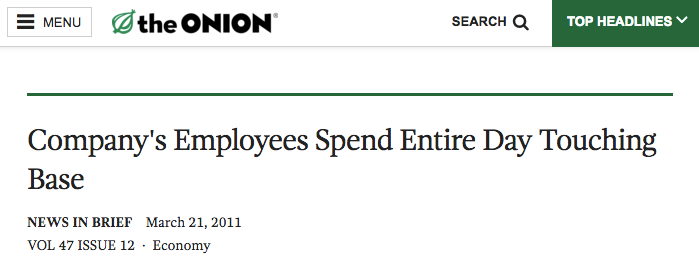I want to talk about real work and fake work.

We have 1:1’s, standup meetings, team meetings, check-ins, all-hands, and serendipitous meetings at the coffee machine. How long did you spend writing google docs, emails, slack chats, gchats, hipchats, and wikis? What percentage of your day comprised of tuning your vimrc/emacs/bashrc and organizing your trello lists? Are you patting yourself on the back for reaching Inbox Zero?
How many times today did a customer notice something you did?
Sam Altman writes about fake work for startup founders:
In general, startups get distracted by fake work. Fake work is both easier and more fun than real work for many founders. Two particularly bad cases are raising money and getting personal press; we’ve seen many promising founders fall in love with one or (usually) both of these, which nearly always ends badly. But the list of fake work is long.
I tell founders to consider how directly a task relates to growing. Obviously, building and selling are the best. Things like hiring are also very high on the list—you will need to hire to sustain your growth rate at some point. Interviewing lots of lawyers has got to be near the bottom.
So now we have rules for founders/CEO’s:
Real work: Building/Coding and sales, probably hiring.
Fake work: Interviewing lots of lawyers.
Does Sam think lawyers are unnecessary? No, but he realizes picking the 1st or 2nd best lawyer is indistinguishable from choosing the 12th best when it comes to your business. Finding the best employees is a better use of a CEO’s time.
But what about everyone else? How do we distinguish between real work and fake work?
Toyota’s legendary production system strives to eliminate waste everywhere. When talking about waste, Toyota’s Shigeo Shingo observed that only the last turn of a bolt tightens it.

That final turn in software engineering is shipping code. There are other activities so closely tied to deploying code that they are undoubtedly Real Work, such as programming and reviewing another engineer’s code. What about everything else?
I define Real Work as
A. Work that creates an immediate and positive change in your product/service
B. Work that is a direct constraint to the completion of A
C. Work you have been uniquely hired to do.
Type C has to be included because many jobs don’t touch A and B, but someone has to do them. Google famously hired a masseuse, Bonnie Brown, when they had only 40 employees. Was she improving our search results in 1999? Maybe not, but Larry and Sergei thought it was critical to their success. For Bonnie, she should be confident that shipping each great massage (type C) was Real Work as it had been identified by the business as type B work.
So why make the distinction between A, B, and C at all? Why not just say Real Work is what you were hired to do and leave the question of whether it’s valuable or not to the person who hired you. It’s because most of our jobs have a degree of autonomy in the the tasks we take on. We should prioritize type A tasks and have a high standard for B tasks. We should eliminate any B tasks that don’t enhance our ability to complete A tasks. Fake work is anything that doesn’t live up to that standard.
Things you can do tomorrow to minimize Fake Work
1. Skip a meeting you don’t need to attend
2. Turn your weekly meeting into a bi-weekly meeting, or even monthly
3. Be concise in communications. Be polite, but formality in email is dead.
4. Don’t jump into conversations just because you can. Comments can be useful, but they also add cognitive load to an issue.
5. Eliminate, automate, or delegate menial tasks.
6. “Table it!” Brian Sloane introduced this to me. If two people are having a drawn out discussion in a meeting, put your hand on the table (or in the air) and say “Table it” to indicate that this discussion should continue in another channel at a later time.
Things you can do tomorrow to maximize Real Work
1. Figure out what real work means for you in your job.
2. Schedule time specific tasks. Treat them like appointments.
3. Don’t check your email until you’ve been at work for an hour. This is an old Tim Ferris trick. If you’re feeling brave, forego Slack, too.
4. Observe the habits of people who get things done. Shamelessly steal them.
Minimizing fake work doesn’t mean you should eat lunch at your desk everyday. The advantage of focusing on Real Work is so you can perform at a high level and still live your life.
Leave a Reply